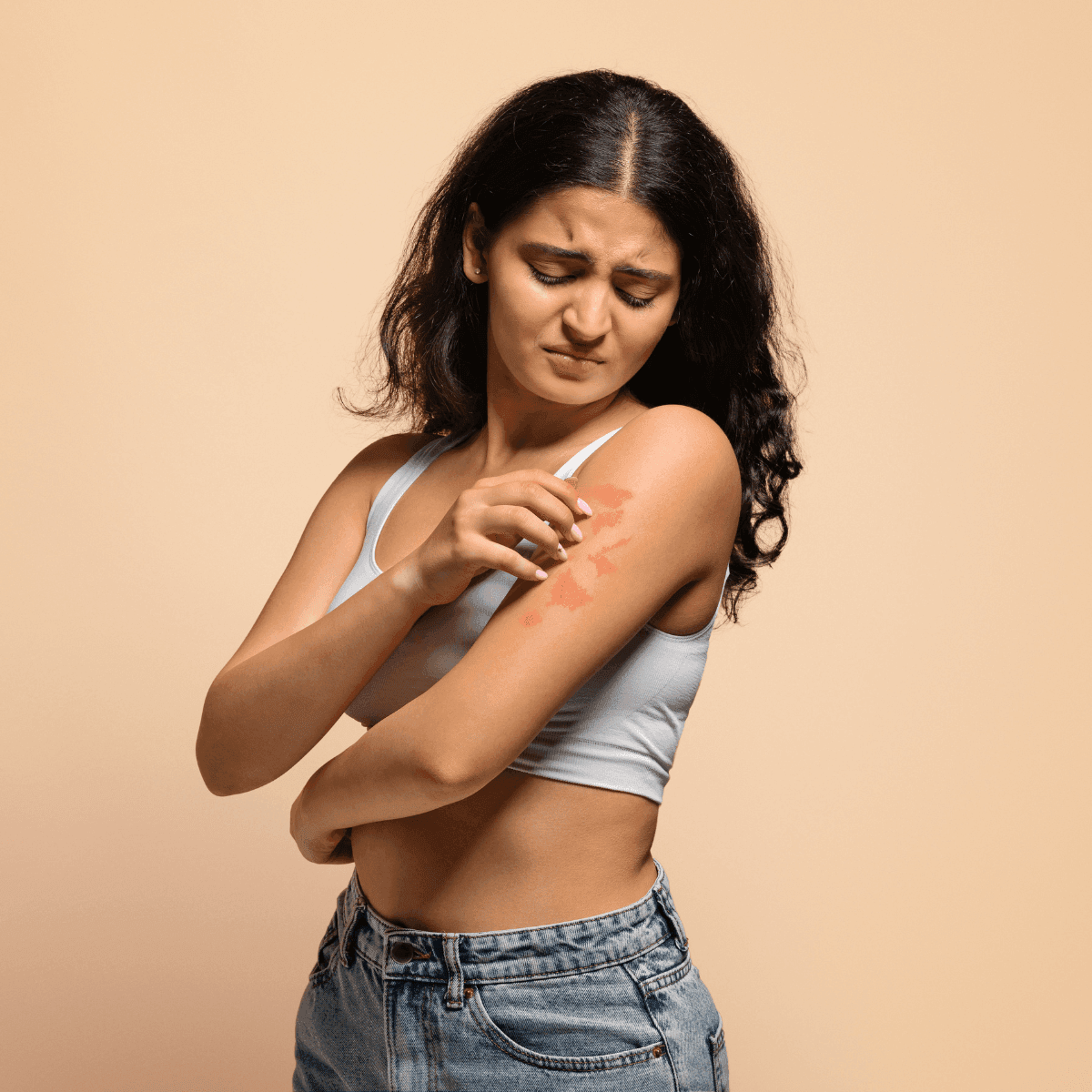If you’ve ever dealt with persistent red patches of skin that refuse to budge, chances are you’ve wondered: “What’s going on with my skin?” Psoriasis is more than just a frustrating skin condition – it’s a chronic autoimmune disorder that millions of people live with every day. But before you let it get the best of you, know this: with the right information and tools, managing psoriasis is absolutely possible. Let’s dive into the world of psoriasis and learn how to keep it under control.
Contents
What is Psoriasis?
Psoriasis is a chronic skin condition that occurs when your immune system decides to hit the fast-forward button on skin cell production. Normally, skin cells renew every few weeks. With psoriasis, that cycle speeds up to just a few days, causing cells to pile up on the surface. The result? Scaly, inflamed patches of skin that can itch, crack, and even bleed.
There’s more than one type of psoriasis, and they all have their unique quirks:
- Plaque Psoriasis: The most common type, it’s characterized by thick, silvery scales over red patches of skin.
- Guttate Psoriasis: Think small, red spots scattered like raindrops – often triggered by infections like strep throat.
- Pustular Psoriasis: Painful, pus-filled bumps that are as uncomfortable as they sound.
- Inverse Psoriasis: Red, shiny lesions in skin folds like under the breasts or around the groin.
- Erythrodermic Psoriasis: The rarest and most severe form, covering large areas of the body with a fiery redness.
While it’s not contagious (so relax, you won’t “catch” it), psoriasis can be hereditary. If your parents or siblings have it, your odds go up.

Common Symptoms and Triggers
The symptoms of psoriasis are hard to miss. From red, scaly patches to dry, cracked skin that may bleed, it can be an uncomfortable – and sometimes painful – condition to live with. Add persistent itching and even joint pain in some cases, and it’s clear why this skin condition can affect more than just your appearance.
But what makes it flare up in the first place? Triggers vary from person to person, but here are the usual suspects:
- Stress: High levels of stress can send your immune system into overdrive, worsening symptoms.
- Weather: Cold, dry climates are a nightmare for psoriasis, while sunny days can sometimes offer relief.
- Diet: While not a direct cause, certain foods – like processed junk or alcohol – can aggravate symptoms for some people.
- Infections: Even a minor sore throat can trigger a guttate psoriasis flare-up.
Knowing your triggers is half the battle. Keep a diary of flare-ups to spot patterns and take control.
Diagnosis and Medical Treatments
Psoriasis might look obvious, but a dermatologist will want to take a closer look to confirm. Diagnosis is usually straightforward, involving a physical exam or, in rare cases, a skin biopsy to rule out other conditions.
Treatment is usually all about slowing down that rapid cell production and soothing inflammation. Here’s the lowdown on options:
- Topical Treatments: These are your first line of defense. Corticosteroids can reduce inflammation, while salicylic acid helps slough off scales. Vitamin D creams like calcipotriol can also work wonders.
- Phototherapy: Light therapy involves exposing skin to UVB light under medical supervision. It’s not exactly a beach vacation, but it can calm flare-ups.
- Systemic Treatments: For severe cases, oral or injectable medications – like biologics – target specific immune responses. Think of them as precision tools for tackling psoriasis from the inside out.
Always consult a dermatologist to find the right treatment plan for your specific case.

Lifestyle Changes for Managing Psoriasis
Managing psoriasis doesn’t stop with medical treatments; lifestyle tweaks can make a huge difference in keeping flare-ups at bay.
- Skincare Routine: Be gentle with your skin. Opt for fragrance-free cleansers and thick, hydrating moisturizers to lock in moisture and protect against dryness. And don’t skimp on sunscreen – UV rays can be both friend and foe.
- Anti-Inflammatory Diet: While no diet can “cure” psoriasis, eating anti-inflammatory foods like salmon, leafy greens, and berries might reduce symptoms. Limit alcohol, sugar, and processed foods – they’re common culprits for worsening inflammation.
- Stress Management: Chronic stress can wreak havoc on your skin. Incorporate relaxation techniques like yoga, meditation, or even a hobby that helps you unwind. Your skin will thank you.
These small changes can make a big impact on your overall well-being and help reduce flare-ups over time.
Popular Cosmetic Treatments and Considerations
If you’re navigating psoriasis, you might wonder: “Can I still enjoy beauty treatments?” The answer is yes – with a few precautions.
- Gentle Exfoliation: Mild exfoliating treatments can help remove scales, but anything harsh could irritate your skin. Always consult your dermatologist before booking.
- Makeup Tips: Use lightweight, non-comedogenic products that won’t clog pores or irritate sensitive skin. Green-tinted primers can help neutralize redness.
- Treatments to Avoid: Skip aggressive peels, laser treatments, or any procedure that could aggravate your skin.
When in doubt, choose beauty options tailored for sensitive skin to keep things smooth and irritation-free.
Psychological Impact of Psoriasis
Let’s not sugarcoat it – psoriasis can be emotionally draining. It’s tough to feel confident when you’re battling visible symptoms, and the stigma surrounding skin conditions doesn’t help. But remember: you’re not alone.
- Seek Support: Joining a support group or connecting with others who understand what you’re going through can be incredibly empowering.
- Boost Your Confidence: Focus on self-care, whether it’s a new hairstyle, outfit, or even a bold lip color that makes you feel amazing. You are so much more than your skin condition.
If feelings of anxiety or depression persist, don’t hesitate to reach out to a mental health professional. Your emotional well-being is just as important as your physical health.
Psoriasis may be a chronic condition, but it doesn’t have to control your life. By understanding what triggers it, exploring effective treatments, and embracing supportive lifestyle changes, you can keep flare-ups in check and feel confident in your skin. Remember, managing psoriasis is a journey – and you’re not alone on this path.


